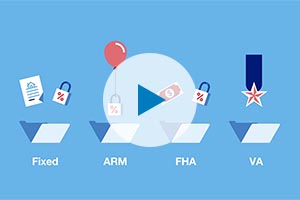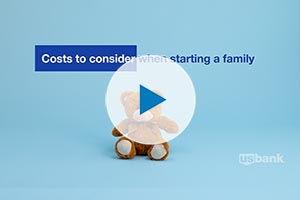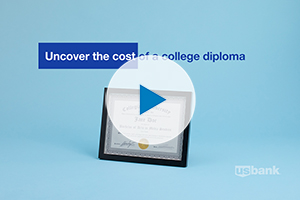
Preparing for retirement: 8 steps to take

What is Medicare? Understanding your coverage options

Do I need a financial advisor?

Retirement savings by age

7 financial questions to consider when changing jobs

How a Health Savings Account (HSA) can benefit your retirement plan

Checklist: financial recovery after a natural disaster

When should I refinance a mortgage?

Co-signing 101: Applying for a loan with co-borrower

How to build credit as a student

Should I itemize my taxes?

Allowance basics for parents and kids

How to gain financial independence from your parents

Practical money skills and financial tips for college students

Student loan scams and other common student scams to be aware of

5 tips for creating (and sticking to) a holiday budget

Investment strategies by age

6 things to know about long-term care insurance cost and benefits

Military homeownership: Your guide to resources, financing and more

How to plan and save for adoption and in vitro fertility treatment costs

Car shopping: Buying versus leasing your next vehicle

For today's homebuyers, time and money are everything

How I did it: Bought a home without a 20 percent down payment

How I did it: Built living spaces to support my family

Money Moments: Tips for selling your home

Overcoming high interest rates: Getting your homeownership goals back on track

3 ways to keep costs down at the grocery store (and make meal planning fun)

5 things to consider when deciding to take an unplanned trip

Certificates of deposit: How they work to grow your money

What financial advice would you give your younger self?

Dear Money Mentor: How do I pick a savings or checking account?

10 ways to increase your home’s curb appeal

What you should know about buying a car

Is it the right time to refinance your mortgage?

6 questions to ask before buying a new home

5 things to avoid that can devalue your home

What is a home equity line of credit (HELOC) and what can it be used for?

Your financial aid guide: What are your options?

9 simple ways to save

Is raising backyard chickens a good idea financially?

Here’s how to create a budget for yourself

Money Moments: How to manage your finances after a divorce

Helpful tips for safe and smart charitable giving

Money Moments: 8 dos and don’ts for saving money in your 30s

Tips to raise financially healthy kids at every age

Travel for less: Smart (not cheap) ways to spend less on your next trip

Understanding guardianship and power of attorney in banking

Should you buy now, pay later?

What’s in your emergency fund?

What you need to know about renting

From LLC to S-corp: Choosing a small business entity

6 tips for trust fund distribution to beneficiaries

How to build wealth at any age

How to manage your money: 7 tips to improve your finances

LGBTQ+ financial planning tips

Your 5-step guide to financial planning

8 steps to take before you buy a home

Are professional movers worth the cost?

What to know when buying a home with your significant other

Mortgage basics: How much house can you afford?

Mortgage basics: Finding the right home loan for you

5 financial goals for the new year

Annual insurance policy review checklist

Loud budgeting explained: Amplify your money talk

How I did it: Turned my side hustle into a full-time job

Retirement plan options for the self-employed

Checking and savings smarts: Make your accounts work harder for you

5 reasons why couples may have separate bank accounts

It's possible: 7 tips for breaking the spending cycle

Myths vs. facts about savings account interest rates

Closing on a house checklist for buyers

Multiple accounts can make it easier to follow a monthly budget

Is it time to get a shared bank account with your partner?

Don’t underestimate the importance of balancing your checking account

7 steps to keep your personal and business finances separate

How to Adult: 5 ways to track your spending

Which is better: Combining bank accounts before marriage — or after?

5 tips for parents opening a bank account for kids

6 questions students should ask about checking accounts

30-day adulting challenge: Financial wellness tasks to complete in a month

Estate planning checklist: 8 steps to secure your legacy

8 steps to choosing a health insurance plan

Key milestone ages as you near and start retirement

How to build a financial plan that covers your savings and expenses

5 ways to maximize your garage sale profits

Estate planning documents: Living trusts vs. will vs. living will

Why estate planning is important

Year-end financial checklist

Pet ownership costs: planning for the unexpected

Housing market trends and relocation impact

Finance or operating lease? Deciphering the legalese of equipment finance

Buying or leasing? Questions to ask before signing a contract

Insource or outsource? 10 considerations

The secret to successful service provider integration

Safeguarding the payment experience through contactless

COVID-19 safety recommendations: Are you ready to reopen?

Higher education and the cashless society: Latest trends

Unexpected cost savings may be hiding in your payment strategy

Protecting cash balances with sweep vehicles

Changes in credit reporting and what it means for homebuyers

High-cost housing and down payment options in relocation

What corporate treasurers need to know about Virtual Account Management

Crypto + Relo: Mobility industry impacts

For today's relocating home buyers, time and money are everything

How to sell your business without emotions getting in the way

5 steps to take before transitioning your business

10 tips on how to run a successful family business

Talent acquisition 101: Building a small business dream team

Costs to consider when starting a business

How to test new business ideas

The costs of hiring a new employee

How to expand your business: Does a new location make sense?

How to build a content team

Multigenerational household financial planning strategies

How to track expenses

How to manage your finances when you're self-employed

Good debt vs. bad debt: Know the difference

Good money habits: 6 common money mistakes to avoid

Reviewing your beneficiaries: A 5-step guide

How to talk about money with your family

Financial steps to take after the death of a spouse

Retirement advice: How to retire happy

Retirement income planning: 4 steps to take

Preparing for retirement: 8 steps to take

Transitioning from the military to the civilian workforce

Working after retirement: Factors to consider

4 steps to finding a charity to support

Year end tax planning tips

Tips for navigating a medical hardship when you’re unable to work

11 essential things to do before baby comes

Webinar: Uncover the cost: Starting a family

Preparing for adoption and IVF

Checklist: 10 questions to ask your home inspector

What you need to know as the executor of an estate

What documents do you need after a loved one dies?

How does money influence your planning?

College budgeting: When to save and splurge

Student checklist: Preparing for college

Uncover the cost of a college diploma

How to save money in college: easy ways to spend less

The A to Z’s of college loan terms

5 things to know before accepting a first job offer

How I did it: Paid off student loans

Bank Notes: College cost comparison

Tips to earn that A+ in back-to-school savings

How to avoid student loan scams

Recognize. React. Report. Don't fall victim to financial exploitation

Webinar: U.S. Bank asks: Are you safe from fraud?

Is online banking safe?

8 tips and tricks for creating and remembering your PIN

Pros and cons of a personal line credit

3 tips for saving money when moving to a new home

Financial checklist: Preparing for military deployment

Growing your savings by going on a ‘money hunt’

Working with an accountability partner can help you reach your goals

Why a mobile banking app is a ‘must have’ for your next vacation

How to decide when to shop local and when to shop online

Does your savings plan match your lifestyle?

Uncover the cost: Wedding

Uncover the cost: International trip

Tips to overcome three common savings hurdles

Adulting 101: How to make a budget plan

Personal loans first-timer's guide: 7 questions to ask

Mindset Matters: How to practice mindful spending

How can I help my student manage money?

How to manage money in the military: A veteran weighs in

You can take these 18 budgeting tips straight to the bank

Save time and money with automatic bill pay

How to best handle unexpected expenses

Stay on budget — and on the go — with a mobile banking app

Do you and your fiancé have compatible financial goals?

U.S. Bank asks: Transitioning out of college life? What’s next?

U.S. Bank asks: Do you know your finances?

U.S. Bank asks: Do you know what an overdraft is?

Personal finance for teens can empower your child

How to save for a wedding

Dear Money Mentor: How do I set and track financial goals?

Lost job finance tips: What to do when you lose your job

Money Moments: 3 smart financial strategies when caring for aging parents

Money management guide to financial independence

First-timer’s guide to savings account alternatives

How to stop living paycheck to paycheck post-pay increase

Practical money tips we've learned from our dads

How grandparents can contribute to college funds instead of buying gifts

How to open and invest in a 529 plan

Using 529 plans for K-12 tuition

Is a home equity loan for college the right choice for your student

Parent checklist: Preparing for college

How to apply for federal student aid through the FAFSA

What to consider before taking out a student loan

Consolidating debts: Pros and cons to keep in mind

How to use debt to build wealth

Know your debt-to-income ratio

Crypto + Homebuying: Impacts on the real estate market

How I did it: Bought my dream home using equity

House Hacks: How buying an investment property worked as my first home

Managing the impacts of appraisal gaps in a hot housing market

Spring cleaning checklist for your home: 5 budget-boosting tasks

Saving for a down payment: Where should I keep my money?

Your guide to breaking the rental cycle

Checklist: 6 to-dos for after a move

What are conforming loan limits and why are they increasing

Uncover the cost: Building a home

The lowdown on 6 myths about buying a home

4 ways to free up your budget (and your life) with a smaller home

Get more home for your money with these tips

Money Moments: How to finance a home addition

Beyond the mortgage: Other costs for homeowners

10 questions to ask when hiring a contractor

What is an escrow account? Do I have one?

These small home improvement projects offer big returns on investment

Should you get a home equity loan or a home equity line of credit?

Is a home equity line of credit (HELOC) right for you?

How to use your home equity to finance home improvements

How do I prequalify for a mortgage?

Home equity: Small ways to improve the value of your home

Can you take advantage of the dead equity in your home?

10 uses for a home equity loan

Improving your credit score: Truth and myths revealed

Should you give your child a college credit card?

U.S. Bank asks: What do you know about credit?

